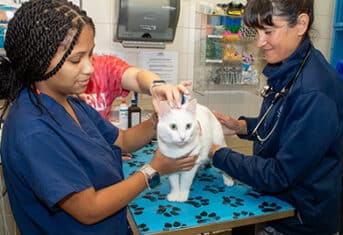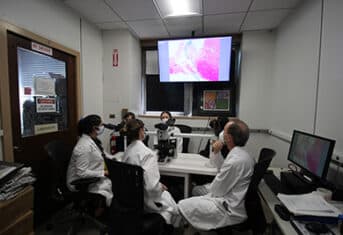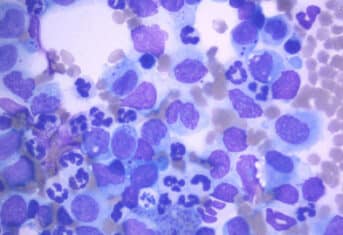Do Cancer Treatments Affect a Pet’s Quality of Life?

Do Cancer Treatments Affect a Pet’s Quality of Life?
November is Pet Cancer Awareness Month. To help raise awareness about veterinary oncology, I am devoting my November blogposts to the topic. Last week, my blogpost highlighted the incredible progress made in veterinary oncology over the last 40 years. Today, I focus on a major concern for pet families affected by cancer: quality of life during cancer treatment.
Most people think of chemotherapy when they think of cancer treatment, but veterinary cancer specialists also use radiation and surgery to treat pets with cancer. Below, I summarize the latest research on quality of life from pet owners whose pets have undergone cancer treatment.
Veterinary Surgical Oncology and Quality of Life
Many pet owners are anxious about cancer treatment for their animal. When their pet’s oncologist recommends surgery, anesthesia is always a concern, especially in dogs and cats that are already sick and often of an advanced age. The good news is that veterinarians take anesthesia administration very seriously – including the Anesthesia and Pain Management team at AMC, led by a board-certified veterinary anesthesiologist. We use strict protocols before, during, and after every surgical procedure to ensure safe and effective anesthesia for our patients.

Hemangiosarcoma of the spleen is a tumor that frequently requires emergency surgery because of internal bleeding. A survey of dog owners whose dogs had a bleeding splenic mass removed gives encouraging information about postoperative quality of life. These owners reported few postoperative complications in their dogs, a rapid recovery and an improved quality of life after splenectomy.
Previously, I have written about another surgical procedure for treatment of cancer, limb amputation, and pet owners’ satisfaction with the outcome of that surgical procedure.
Veterinary Radiation Oncology and Quality of Life
AMC has been treating pets with radiation therapy since the early 1990s. Our fourth radiation therapy machine just had its ribbon cutting ceremony. Anesthesia is again a common concern for pet owners since each treatment requires a short general anesthesia. However, in a strong endorsement of radiation therapy for dogs, 94% of dog owners reported the radiation treatments were better than expected for their pet. This is based on surveying dog owners before, during and after their dogs were treated with radiation.
Veterinary Chemotherapy and Quality of Life
In a survey of pet owners whose pets received chemotherapy drugs, owners typically observed minimal side effects. Pet owners reported their pets lived longer with an improved quality of life due to the chemotherapy treatments. Additionally, multi-drug chemotherapy treatments were not associated with lower quality of life when compared to single-drug chemotherapy treatments.
Still Not Convinced? Talk to Other Pet Owners
If this data is not convincing about the positive impact of cancer treatment in pets, or if you are still concerned about your pet’s quality of life during cancer treatment, ask your pet’s oncologist if you could talk to someone whose pet has gone through a similar treatment protocol. Or search for neighborhood and disease-specific support groups on Facebook. I have found a conversation with someone in a similar situation to be very helpful to worried pet families.































